Interview with Santa Clara Law School Former Assistant Dean Alexandra Horne
Published October 2006, last updated July 2009
Top-Law-Schools.com is proud to feature an exclusive interview with Assistant Dean Alexandra Horne (“Alexa”), discussing the nationally ranked and renowned High Technology law program that she oversees (View Santa Clara Law School Profile). Alexa’s care and interest in leading this program to greater heights was evident throughout the interview.
Alexa, please talk about your personal history with Santa Clara’s High Technology program, both as Dean and as a student, as well as the history of this program’s rise to excellence over the last 15 years.
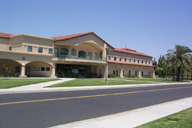 I came to the law school six months ago and am continuing to build upon the work of Elizabeth Powers, who was Assistant Dean of the High Tech Law Program for the two years previous. Santa Clara Law School has had an outstanding Intellectual Property (“IP”) and high tech law program for a number of years. When I came to Santa Clara Law School in 1989, I came for the IP program. I knew that I wanted to be an IP attorney in the San Francisco Bay Area and I choose Santa Clara over all the other law schools in the Bay Area because of its IP program.
I came to the law school six months ago and am continuing to build upon the work of Elizabeth Powers, who was Assistant Dean of the High Tech Law Program for the two years previous. Santa Clara Law School has had an outstanding Intellectual Property (“IP”) and high tech law program for a number of years. When I came to Santa Clara Law School in 1989, I came for the IP program. I knew that I wanted to be an IP attorney in the San Francisco Bay Area and I choose Santa Clara over all the other law schools in the Bay Area because of its IP program.
I think that ever since Silicon Valley has been a semiconductor and tech center, students have come to Santa Clara because of the IP and High Tech program. When I attended there was not a High Tech certificate program, so that is one of the changes that has occurred since I was a student here. Additionally, the course offerings have expanded over time. However, I was able to take all the core courses on patents, copyrights, trademarks, trade secrets, and unfair competition, so I was given a terrific education that prepared me for my technology practice as a lawyer at Skjerven Morrill.
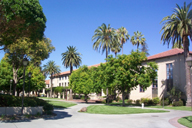 With former Dean Player’s founding of the High Tech Law Institute and appointing an Assistant Dean as head of the Institute and High Tech Law Program, the law school really improved the High Tech program and made it a large focus of the school. The program continues to develop and expand and now offers a certificate program in High Tech. Students can get the certificate with an emphasis upon Technology Law, upon corporate issues within IP law, or an International IP certificate that has an International law component.
With former Dean Player’s founding of the High Tech Law Institute and appointing an Assistant Dean as head of the Institute and High Tech Law Program, the law school really improved the High Tech program and made it a large focus of the school. The program continues to develop and expand and now offers a certificate program in High Tech. Students can get the certificate with an emphasis upon Technology Law, upon corporate issues within IP law, or an International IP certificate that has an International law component.
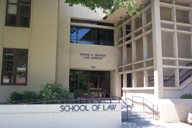 The law school was delighted when Donald Chisum joined the faculty. Don’s treatise on patent law is the definitive treatise and both lawyers and judges refer to and cite this treatise. While Santa Clara has always been on the map for its excellent IP and technology law programs, Don’s joining the faculty increased the program’s national presence as confirmed by law school rankings. We have been ranked amongst the top ten law schools in intellectual property by U.S. News ever since they started ranking IP programs three years ago. Students come from across the country and around the world to this program because of our reputation.
The law school was delighted when Donald Chisum joined the faculty. Don’s treatise on patent law is the definitive treatise and both lawyers and judges refer to and cite this treatise. While Santa Clara has always been on the map for its excellent IP and technology law programs, Don’s joining the faculty increased the program’s national presence as confirmed by law school rankings. We have been ranked amongst the top ten law schools in intellectual property by U.S. News ever since they started ranking IP programs three years ago. Students come from across the country and around the world to this program because of our reputation.
Assistant Dean Horne, what are some unique opportunities that are found only at Santa Clara Law School’s High Technology Program, such as excellent Internships and connections with technology companies.
Numerous top IP firms and technology companies, such as Cisco, Ebay, Sony Entertainment, offer internships to students. Both firms and companies are delighted to have our students and there are more corporate sponsors seeking interns than students seeking internships. Many students receive job opportunities from these companies upon graduation.
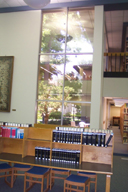 For example, Sun Microsystems is developing a very unique program that is multiyear in scope, and their interns are immediately hired after leaving Santa Clara Law School. This is rare, for most technology companies do not have the training capabilities and require students to work at a law firm for a year or two before they can go in-house. But Sun’s program provides the training throughout the internship, preparing students for immediate employment after graduation.
For example, Sun Microsystems is developing a very unique program that is multiyear in scope, and their interns are immediately hired after leaving Santa Clara Law School. This is rare, for most technology companies do not have the training capabilities and require students to work at a law firm for a year or two before they can go in-house. But Sun’s program provides the training throughout the internship, preparing students for immediate employment after graduation.
Interns not only receive great experience from the 225 hours of work, but also 4 units of credit.
Senior Assistant Dean, Julia Yaffee: Another example of Santa Clara Law School working with local companies is Intel, which is headquartered in Santa Clara. Intel’s IP department is almost exclusively Santa Clara Law School graduates, including their general counsel, Tom Dunlap. This has occurred because for many years Intel sends 3 highly qualified employees to learn high technology law in our part-time program as they work at Intel during the day.
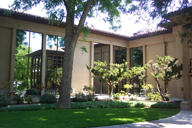 Tom Dunlap, of Intel, and counsel from other local technology firms as well as partners from local law firms are part of the Dean’s High Tech Advisory Counsel. The High Tech Advisory Counsel and Board help shape the IP program and curriculum at Santa Clara Law School. This synergistic partnership with local technology companies and law firms helps maintain the great reputation of our program within Silicon Valley.
Tom Dunlap, of Intel, and counsel from other local technology firms as well as partners from local law firms are part of the Dean’s High Tech Advisory Counsel. The High Tech Advisory Counsel and Board help shape the IP program and curriculum at Santa Clara Law School. This synergistic partnership with local technology companies and law firms helps maintain the great reputation of our program within Silicon Valley.
Alexa: Other opportunities provided at Santa Clara Law School include the numerous conferences and networking opportunities that are provided. The High Technology Program sponsors conferences throughout the year. Our largest conference is IP week, which is a weeklong series of lectures on all aspects of technology law. The Santa Clara Computer & High Technology Journal provides a 2 day symposium examining various IP issues. Additionally, we work in conjunction with the Markkula Center for Applied Ethics to provide a conference on examining biotech concerns.
The Intellectual Property Association is very active and constantly networks with local employers. For example, every week we have High Tech Tuesday, where local practitioners come in and discuss their practice areas and then later mingle with the students.
What are the Future Goals and Directions of the High Technology Program?
One of the issues we are working on in the future is to continue to add to our full-time faculty in the IP/Technology program. We just hired Tyler Ochoa from Whittier University, who focuses upon Copyright, Trademark, and Defamation law issues. We are thrilled to have him.
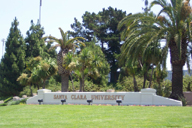 Being located in the center of Silicon Valley, we are better situated than Stanford or Boalt at attracting local practitioners who are expert at Technology Law. These practitioners are wonderful and smart and are right on top of new legal issues, for they practice their area of law daily. They are available generally during evenings or weekends to teach the full-time and part-time students.
Being located in the center of Silicon Valley, we are better situated than Stanford or Boalt at attracting local practitioners who are expert at Technology Law. These practitioners are wonderful and smart and are right on top of new legal issues, for they practice their area of law daily. They are available generally during evenings or weekends to teach the full-time and part-time students.
We are continually expanding our course offerings in IP and High Tech. Additionally, we will strengthen our relationships with the local high tech law firms, and hopefully they will assist and invest in our program and continue to hire our graduates.
Alexa, thank you for speaking with us today about your plans to expand and improve your already renowned program in High Technology Law.
Read Dean Polden’s interview discussing his future goals for Santa Clara Law School.
Interview with Edward Tom, Former Dean of Admissions U.C. Berkeley Boalt Hall School
Interview with Richard Geiger, Former Associate Dean and Dean of Admissions for Cornell Law School
Interview with Former Dean David E. Van Zandt of Northwestern University School of Law
Interview with Former Dean Robert Berring of Boalt Hall
Interview with Former Dean Sarah Zearfoss University of Michigan Law School
Interview with Professor Brian Leiter
Interview with Former Dean Victoria Ortiz UC Irvine School of Law
Interview with Former Dean Donald Polden of Santa Clara
Interview with Former Dean Jeanette Leach of Admissions to Santa Clara University's School of Law
Interview with Santa Clara Law School Former Assistant Dean Alexandra Horne
Interview with Former Dean Hasl of Thomas Jefferson School of Law
Interview with Joan Howland, Former Associate Dean at the University of Minnesota
Interview with Former Dean Evan Caminker of University of Michigan Law School
Interview with Former Dean Erwin Chemerinsky UC Irvine School of Law
Interview with Former Dean Jason Trujillo of UVA Law
Interview with Former Dean Stewart Schwab of Cornell Law School
Interview with Ann Perry of The University of Chicago Law School
Interview with Johann Lee at Northwestern University Law School
Interview with Kevin Johnson UC Davis Law
Interview with Former Dean Robert Rasmussen of USC Law
Interview with Dr. Karen Reagan Britton, UT Law
Interview with Dean Doug Blaze, UT Law
Interview with Jannell Roberts, Former Associate Dean of Admissions at Loyola Law
Interview with Susan L. Krinsky, Former Associate Dean of Admissions at Tulane Law
Interview with Faye Shealy, Former Associate Dean of Admissions at William & Mary Law School
Interview with Robert H. Jerry, II, Former Dean & Levin Mabie and Levin Professor of Law
Interview with Former Dean Earl Martin of Gonzaga Law
Interview with Stephen Brown, Associate Dean of Admissions at the Fordham University School of Law
Interview with Jacqlene Nance, Former Director of Admissions at the University of Kansas School of Law
Interview with Former Dean Robert Schwartz at UCLA School of Law
Interview with Matthew Diller, Former Dean and Professor of Law at Benjamin N. Cardozo School of Law
Interview with Andy Cornblatt, Dean of Admissions at Georgetown University Law Center (GULC)
Interview with Chris Guthrie, Dean of the Vanderbilt University Law School
Interview with G. Todd Morton, Assistant Dean and Dean of Admissions for Vanderbilt University Law School
Interview with Susan Lee, Former Director of Admissions at Gonzaga University School of Law
Interview with Arizona State University Sandra Day O’Connor College of Law Former Dean and Foundation Professor of Law – Paul Schiff Berman
Interview with Alissa Leonard, Director of Admissions and Financial Aid at the Boston University School of Law
Interview with David Partlett, Former Dean of Emory University School of Law
Interview with Michelle Rahman, Former Associate Dean for Admissions at the University of Richmond School of Law
Interview with Isabel DiSciullo, Former Assistant Dean of Admissions for Drexel Law
Published July 2010 Introduction Top-Law-Schools.com would like to thank Asha Rangappa, Associate Dean for Admissions at Yale Law School, for taking the time to answer our questions! TLS: Since becoming Associate Dean in 2007, you have reached out to th
Interview with Josh Rubenstein, Former Assistant Dean for Admissions at Harvard Law School
Interview with Renee C. Post at the University of Pennsylvania School of Law
Interview with Former Dean Rita C. Jones of Boston College Law School
Interview with S. Brett Twitty, Former Director of Admissions, W&L Law
Interview with Lillie V. Wiley-Upshaw, Vice Dean for Admissions and Financial Aid, University at Buffalo Law School
Interview with Nikki Laubenstein, Director of Admissions at Syracuse University College of Law
Interview with Janet Laybold, Former Associate Dean, Admissions, Career and Student Services, Washington University School of Law
Interview with Anthony Crowell, Former Dean of New York Law School
Interview with Jessica Berg and Michael Scharf, Former Co-Deans of Case Western Reserve University School of Law
Interview with Alyson Suter Alber, Associate Dean for Enrollment Planning and Strategic Initiatives, Case Western Reserve University School of Law
Interview with Jeffrey A. Dodge, Former Associate Dean of Students, Academic Affairs & Administration, University of Idaho College of Law
Interview with L. Pilar Mensah, Assistant Dean for Admissions; Sondra R. Tennessee, Associate Dean for Student Affairs; and Tiffany J. Tucker, Assistant Dean for Career Development, University of Houston Law Center
Interview with Jay L. Austin, Former Assistant Dean, Admissions and Student Financial Services, UC Irvine School of Law
Interview with Mathiew Le, Former Assistant Dean of Admissions & Financial Aid, University of Washington School of Law
Interview with Daniel M. Filler, Dean and Professor of Law, Drexel University, Thomas R. Kline School of Law
Interview with Donald Tobin, Dean and Professor of Law, the University of Maryland Francis King Carey School of Law
Interview with Amy Mangione, Assistant Dean and Director of Admissions, Albany Law School
Interview with Christopher J. Peters, Former Dean and Professor of Law, The University of Akron School of Law
Interview with Carla Pratt, Dean and Professor of Law, Washburn University School of Law
Interview with Michelle Rahman, Associate Dean for Admissions, the University of Richmond School of Law
Interview with Verna Williams, Interim Dean and Nippert Professor of Law, the University of Cincinnati College of Law
Interview with Allen Rostron, Former Associate Dean for Students and the William R. Jacques Constitutional Law Scholar and Professor of Law, University of Missouri-Kansas City School of Law
Interview with Faye Shealy, Former Associate Dean for Admission, William & Mary Law School
